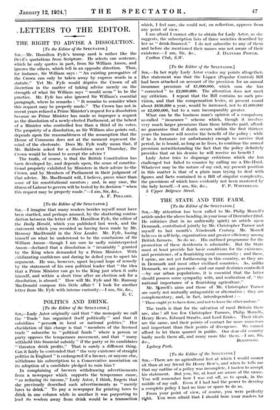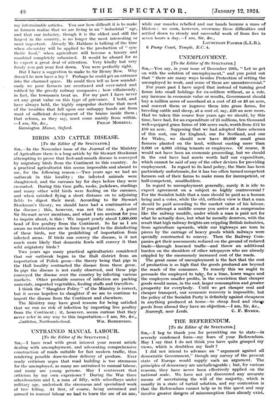[To the Editor of the SPECTATOR.] SIR,—There are no agricultural
feet at which I would sooner sit than at my friend Sir Henry Rew's, and when he tells me that my outline of a policy was incomplete, I hasten to accept his statement. But you, Sir, at least are aware of the cause. You will remember how I was cut off, so to speak, in the middle of my call. Even if I had had the power to develop a complete policy I had no time or space to do so.
From your point of view, of course, you were perfectly right. You were afraid that I should bore your readers by
my interminable articles. You saw how difficult it is to make us farmers realize that we are living in an " industrial " age, and that our industry, though it is the oldest and still the largest in the country, is no longer the most interesting or most important. Already Mr. Haldane is talking of the time when chemistry will be applied to the production of "syn- thetic food," when agriculture will become a luxury and mankind completely urbanized. It would be absurd for us to expect a great deal of attention. Very kindly but very firmly you put your foot down. You were perfectly right.
But I have a suggestion to make to Sir Henry Rew. Why doesn't he now have a try ? Perhaps he could get an entrance into the charmed space. He could then tell us how scandal- ously we poor farmers are overtaxed and over-rated and robbed by the greedy railway companies ; how villainously, in fact, the townsmen treat us. For my part I have never set any great value on this type of grievance. I hold, and have always held, the highly unpopular doctrine that most of the troubles that fall upon our unhappy heads are from want of sufficient development of the brains inside them ; that reform, as they say, must come mainly from within.







































 Previous page
Previous page